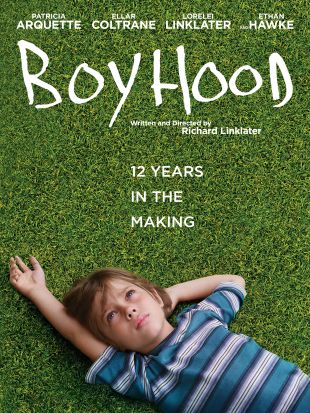
From the beginning of his career, Richard Linklater has been fascinated with time. More than half of his films have taken place in real time or over the course of a single day. His nearly three-hour movie Boyhood, which follows a kid as he ages from 6 to 18, was shot in just 39 days, but the catch is that they were spread out over 12 years -- in that span, Linklater captured the physical changes of not just his lead actor, but his entire cast. It's a simultaneously modest and massively ambitious undertaking, so original in its conception and so successful in its execution that it deserves to be remembered as a landmark achievement.
Ellar Coltrane, who was six when filming began, is front and center as Mason, and not since Daniel Radcliffe scored the role of Harry Potter has a director chosen a child actor so fortuitously. He's an utter natural onscreen, possessing a low-key charisma that the camera reads as unaffected behavior. He never seems like he's acting at any point in the movie.

One of the many special aspects of Boyhood is its almost total lack of a plot; in many ways, it's a straight-up art film. At the same time, there are dramatic moments, and the movie is never less than involving. Mason's fraught relationships with both of his stepfathers provide stomach-churning glimpses of how children deal with severe dysfunction, and his relationships with his divorced mother (Patricia Arquette) and father (Ethan Hawke), as well as his bratty older sister (Lorelei Linklater, the filmmaker's daughter), evolve in ways that feel entirely familiar. The director captures typical moments of adolescent danger that trigger our anxieties, but he does so in such a relaxed way that our fear is equal to our own memories of stupid stuff we did without doing any real damage to ourselves.
Boyhood never builds toward an artificial climax or a single easy sentiment. Even describing it as a coming-of-age story, which is not incorrect, doesn't do justice to the film's vast scope. Linklater has recorded a life not in a documentary fashion, but with a verisimilitude so ingrained that he gets us to empathize with and feel parental toward a character who becomes as close to us as our own family members.

At no point does Linklater draw attention to what he's doing. Setting the movie over 12 years in the 21st century, the director uses cultural cues -- video games, technology, the 2008 presidential election, pop music -- to indicate the passage of time. Never once does he resort to putting dates on the screen, because doing so would take viewers out of this totally immersive experience he's crafted.
Watching characters age over the course of a long movie is nothing new for audiences. We're used to actors playing roles that force them to mature onscreen, and many viewers have become savvy enough to appreciate the difference between skillful old-age makeup and slap-dash painted-on liver spots. Because of this, the grandness of Linklater's accomplishment doesn't sink in until after the movie is over. Watching Ethan Hawke and Patricia Arquette grow older, grayer, and wider doesn't come as a shock -- until you realize that Linklater probably used very minimal makeup on them, if any. We see real human faces change, and there is no substitute for the sheer reality of that. The subtext of the entire project might be that time, a commodity filmmakers rarely have, is the greatest special effect in their arsenal.

You don't need to know about Boyhood's lengthy production schedule in order to understand its greatness. The backstory is absolutely fascinating, but it wouldn't matter if Linklater hadn't used those 12 years to craft the best film he possibly could, resulting in a singular cinematic experience that has, by virtue of its unusual creation, already stood the test of time. The Academy's official verbiage for the Best Director Oscar reads, "Awarded for Excellence in cinematic direction achievement." That's the perfect description of what Richard Linklater has pulled off with Boyhood.
